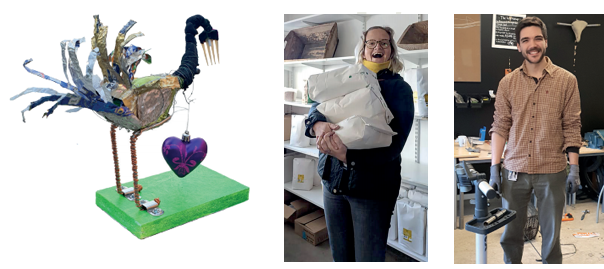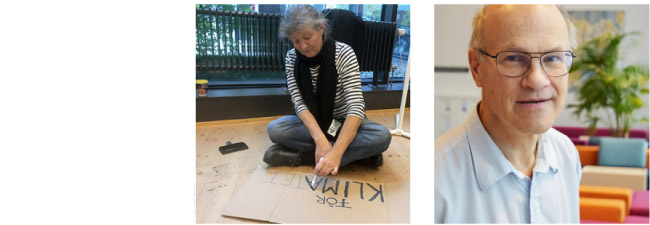Contact

Lisa Matteses Åhrgren, Project Leader, Division of Environmental Integration, SLU, Sida's Helpdesk for Environment and Climate Changes, Environmental Representative, +4618672779

SLU is environmentally certified against the international standard ISO 14001 and since 2018 also registered according to EMAS. The department has a representative in the university environmental organisation, but we do also have our own SOL Transition Group that develops and evaluates policies and guidelines.
All documents och routines are found at the SLU website for environmental work »
As a support for the work of following up the systematical environmental work, within the frames of the environmental certificate, Urban and Rural Development has established the following organisation:
Over-all responsibility: Head of department, Lars Johansson
Responsible for making sure that all procedures are registered, keeping contact with the environmental certificate organisation at SLU and communicate information: Environment representative: Lisa Matteses Åhrgren
Responsible for the follow-up of environmental procedures in research: Head of department, Lars Johansson
Responsible for the follow-up of environmental procedures in the undergraduate education: Director of undergraduate studies, Helen Arvidsson
Responsible for the follow-up of environmental procedures in the postgraduate education: Director of the Research School, Emil Sandström / Director of postgraduate studies, Ann Grubbström
Responsible for the follow-up of environmental procedures in external collaboration: Chairman of the External Collaboration group, Thomas Norrby
Responsible for the follow-up of environmental procedures for business travel: Egencia + Deparment's Project Controller Petra Fabel
Responsible for the follow-up of environmental procedures for procurement: Environmental representative: Lisa Matteses Åhrgren
Responsible for information on the intranet: Communication Officer, Anni Hoffrén
At SOL, there are many co-workers who engage with climate change and environmental issues and work towards a transition to a more sustainable future. Many also have a wish to increase the engagement with these issues at SLU level and take our own initiatives to contribute to the transition towards a more sustainable development. As a result of this, SOL started an environmental group in 2019, which today is called the transition group, as we want to take a broader approach to sustainability.
The aim of the transition group is to discuss and suggest different types of actions and initiatives at the individual level at work, at the management level at SOL, and also more generally at the entire SLU. Convener of the transition group is the environmental representative at SOL, Lisa Åhrgren.
Examples of actions that we already have discussed and decided on:



Image above: The environmental challenge prize and the previous winners Helena Nordström Källström (2018), Daniel Valentini (2019), Karin Gerhardt and Torbjörn Ebenhard (2020), Flora Hajdu (2021), Mari Kågström (2022) and Anders Arnell (2023).
Other issues that are being discussed are how we could reduce food waste, how to facilitate more people to bike/commute by public transport to work, and to increase integration of climate and transition issues in research and education.
Everyone at SOL is welcome to join the transition group! Do you want to know more or join – please contact Environmental Representative Lisa Åhrgren, send an e-mail to: lisa.ahrgren@slu.se
 Consider alternatives to making a journey
Consider alternatives to making a journey» The prefekt resolution behind the travel policy can be read here
Thank you for choosing to travel by train abroad and thus help SOL to achieve the environmental goals faster! This short guide has been produced by the environmental group to make it a little easier to book train tickets. Our goal is that we should make it as easy as possible for employees to choose the most environmentally friendly alternative.
Good luck with your train journey and tell us in our facebook group about it!
https://internt.slu.se/stod-service/admin-stod/hr/sarskilda-omraden/reseforskott-och-betalkort
Alingsås travel agency: www.alingsas-resebutik.se (can take 2-3 weeks when they are busy)
Online agency Tågbokningen.se, www.tagbokningen.se
Denmark: www.dsb.dk
Train in Norway: www.vy.no
Train in Germany: www.bahn.de/
The Railplanner app can help with planning: www.eurail.com/en/plan-your-trip/rail-planner-app
The goal of these guidelines is that the food ordered and paid for by SOL should be healthy, of high quality and be sustainably produced, with low environmental and climate impact, and with high level of care for the animals in milk, meat, egg and fish production. These values are more important than that the food is as cheap as possible.
This document describes SOL´s routines in connection with travel abroad, as well as a number of tips and advice on what to consider in order to safeguard their safety when traveling. The advice applies of course to different extent depending on where and when you travel, but the procedures should be followed. They are for your security and because we at SOL will be able to follow up our staff who are on business trips if something unexpected happens. The first thing you should do before booking a trip is to spend some time doing a safety assessment of the place you are going to visit. Always start by checking out the place you are going to go to, with whom you will go and how the security situation looks at that place and in the country as a whole. Of course, how to behave in different places depends on context. But give yourself time to do some research on the place you are going to visit before you book a ticket / accommodation, etc., and remember that you always have the right to say that you do not want to travel to a place that you consider to be unsafe! You can even change your mind at the last minute.
Check this out before booking a trip
Prepare your arrival
Accommodation Safety
Car journeys

Lisa Matteses Åhrgren, Project Leader, Division of Environmental Integration, SLU, Sida's Helpdesk for Environment and Climate Changes, Environmental Representative, +4618672779